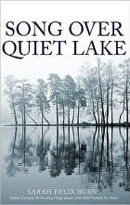
Sylvia is a troubled twenty-something student, and Lydie is an eighty-two year old Tlingit woman from the Yukon who knows exactly where she stands in her life. When the two women meet in their women's literature class at the University of British Columbia, it seems that they have little in common. But Sylvia is a psychology student who is herself in need of therapy and Lydie becomes an unexpected friend who provides that therapy. The character of Sylvia is bristly and pushes people—including this reader—away. It is Lydie who carries this novel. Despite the sorrows that she's suffered throughout her life, she is an intelligent, kind and gentle person. It seems obvious or clichéd that the wise indigenous elder teaches life lessons to the young character, but in Song Over Quiet Lake, it works.
The story is told from the point of view of an array of characters who touch Sylvia's life, both closely and from a remote vantage point—a literary technique that meets mixed success here. In particular, the chapter by her perfect-but-not- perfect-for-her boyfriend, River, sounds contrived. Luckily, the chapters by secondary characters are few, and most of the novel is narrated by the entertaining Lydie and distressed Sylvia. We learn about Lydie's early life living in a lean-to in the far north where, as a child, she nursed her chronically ill parents. We also learn of her first love who she lost to racism and war, her marriage to an abusive man, the drowning death of her young daughter and the struggles of her troubled adult sons. Her positive but pragmatic attitude is a model for the floundering Sylvie, who cannot get past abandonment by her parents. She was first physically abandoned by the father she never knew, and then emotionally abandoned by her mother after her little brother disappeared while Sylvie was babysitting him. Lydie shows Sylvie that life can go on despite heartbreak and loss.
Set mostly in Vancouver, but also in Alberta and the Yukon, Sarah Felix Burns's sense of time and place are sometimes awkward. Rather than viewing this as a defect, however, I found it somewhat charming. The book reminded me of looking at a painting by Matisse, with his wonky sense of proportion, rather than viewing a realistic photograph. Once I stopped looking at this novel as realistic and looked at it as a painting of lives, the faults didn't seem so serious. Despite my quibbles about some of the writing in Song Over Quiet Lake, I found the book to be interesting and unlike anything I've read before.

Second Story Press, paperback, 9781897187678
